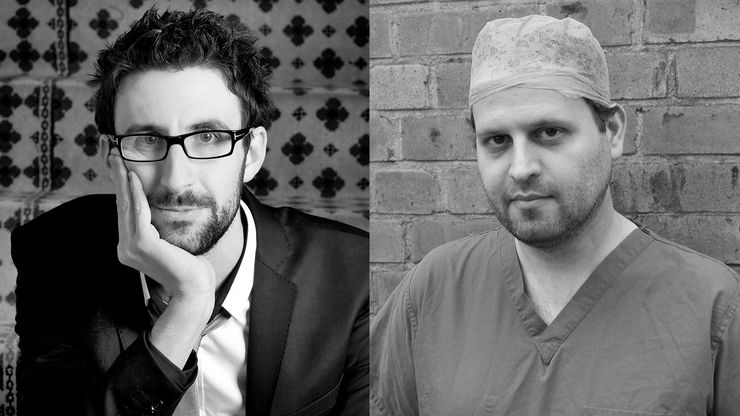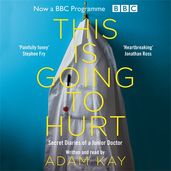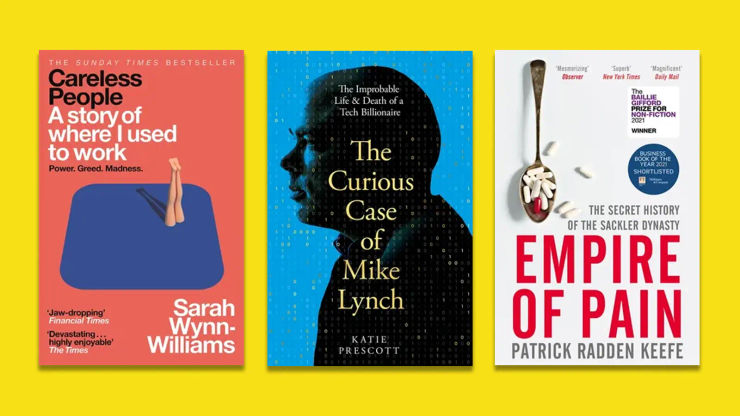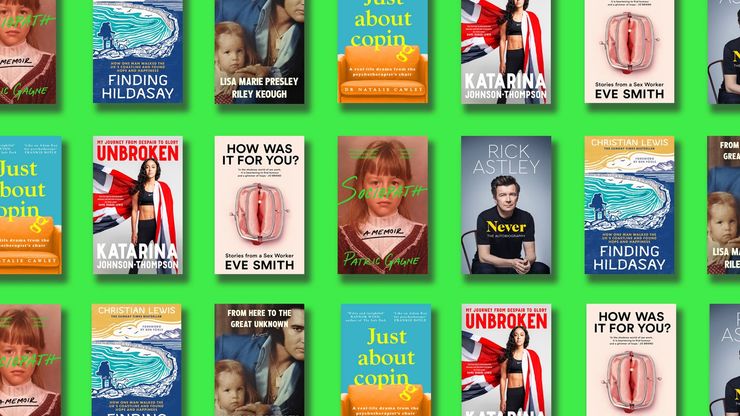Adam Kay talks This is Going to Hurt with Mark Watson
In equal parts hilarious and horrifying, This is Going to Hurt is the memoir of former junior doctor turned comedian and screenwriter, Adam Kay, and has been adapted as a BBC comedy-drama.

A multi-million copy bestseller and Book of the Year at The National Book Awards, This is Going to Hurt was the only thing anyone could talk about when it released in 2017. Now, fans of Adam Kay's heart-wrenching and side-splitting memoir about his career as an NHS doctor will see Adam's story come to life as a BBC TV adaptation this February, starring Ben Whishaw.
While recording the audiobook of This is Going to Hurt, Adam Kay sat down for a chat with fellow comedian and Picador author Mark Watson about the origins of the book, the process of writing, and the challenges that the NHS is facing today.
Mark Watson: I’m here with the author of This is Going to Hurt, Doctor Adam Kay. Are you still Doctor Adam Kay?
Adam Kay: It depends on the situation. I’m Doctor for booking flights if that works (it doesn’t) and for restaurants. I’m still Doctor on my bank card because it took me about three weeks to change it when I qualified and I don’t want to lose the will to live whilst trying to change it back.
MW: Can you describe what the book is about, just in case anyone doesn’t know?
AK: So basically, my book is called This is Going to Hurt: Secret Diaries of a Junior Doctor and it’s that. I worked as a doctor for six years, and eventually stopped being a doctor. During my time as a junior doctor, I kept a record of what I was up to, which you’re told to do in order that you can pass to the next stage of medicine as you have to submit evidence of what you've done. Most people just keep a log, but the frustrated writer in me was just jotting down the weird shit that happened.
MW: I was going to say, the diaries seem a little bit more elaborate than what would normally be required of a house officer.
AK: In full disclosure, in the book I’ve missed out a lot of extremely boring things that happened as it would have made for a very long book. Perhaps I’ll put them in the sequel - the boring bits in between.
‘No one thinks of their own life as being particularly exciting . . . I didn’t think the petty bureaucracy and mundanity of being a junior doctor would be of any interest to anyone.��’
MW: It would have been one hell of a career if it was just made up of all these anecdotes. You say the frustrated writer in you was composing these medical reports; was it ever in your head or did you ever imagine that some sort of artistic endeavour could come out of this when you were doing the miserable rounds on the wards? Did you ever stop and think, some of this is actually quite funny?
AK: I didn’t. No one thinks of their own life as being particularly exciting. These were just anecdotes I would tell at dinner parties, and in general, I didn’t think the petty bureaucracy and mundanity of being a junior doctor would be of any interest to anyone. Also, everyone I knew was a junior doctor, so we were all having the same sorts of experiences.
MW: You came to write This Is Going to Hurt, having left the profession a few years ago, and you’ve been a performer for a few years now. This book comes out of a live show that you did, right?
AK: Yes, and it’s sort of your fault. You came to one of the shows which I was doing, which I’d pulled together out of these diaries on the basis that doctors were having a bit of a rough ride and I’d thought “let’s stand up for doctors a bit”. You came along to see it, and brought a publisher, and here we are.
MW: What I’d really wanted, having enjoyed the show enormously, was to see you suffer having to transcribe it for nine months. Comedians tend to hate each other and there you were in Edinburgh basking in all the glory, and I thought, 'what would bring him back down to earth is the graft of having to turn it into a book, which will take ages.'
How long did you sit on all this material and what prompted you eventually to unleash this show with all these startling personal revelations? Did you feel the show which the book came from was a response to the specific war that doctors are fighting at the moment?
AK: Two things had happened. Underneath it all when I left medicine, I was proving to myself that I was now a writer, a performer, a comedian, I don’t need any of that. So, I wasn’t going for the medical niche. And then I realised that it was something I could draw on. And yes, what is happening to the NHS at the moment did play a part.
MW: You talk in the book about the incident that ultimately led you to think about quitting, and the fact that you were forced to go back to work the day after. People spoke about what had happened like you’d sprained your ankle. Because of the psychological impact of having to keep ploughing through this type of work, are you surprised more [medical professionals] don’t quit?
‘You have to tell people 'come on, we’ve got to keep going', when what you really want to do is to give them a hug and tell them to go home and come back when they’re ready.’
AK: A lot of people are quitting now because of our glorious government. But I’m surprised as many people were as good at keep going as they were. There isn’t a choice, there’s not enough slack. I was guilty of doing the same with the juniors as I managed juniors when I was progressing up the ranks, and I was contributing to the problem. It wasn’t always big disasters, but dealing with them really takes it out of you. You have to tell people 'come on, we’ve got to keep going', when what you really want to do is to give them a hug and tell them to go home and come back when they’re ready.
MW: Is it one of the things you’d like people to get from the book, an appreciation of the mental pressures of the job? I realise that’s a lot to ask of a book, I guess you’re probably mostly just hoping some people buy it.
AK: And laugh, twice.
MW: You’re right, there are some funny bits before all this happens.
AK: Yes, it’s related to that. The central part of the book is where I talk about the concept of doctors being human, and I’m talking about being at work with a blood pressure cuff on my arm, and a patient says 'it’s funny, you don’t think of doctors being ill.' I extrapolate from that, that people don’t think of doctors being human, with all the problems humans have. Everyone has demons, and doctors have demons, and doctors get upset by things and you don’t think of doctors getting upset by things, or being ill, or having to get home.
MW: Are you still optimistic about the future of the NHS?
AK: I don’t think it’s beyond the point of no return, but I think the point of no return is within a reasonably short distance.
MW: Well, that could be worse.
AK: It could be worse. It doesn’t matter who the government is or who the regime is, it just needs more money. It would just be so devastatingly sad if the NHS becomes something else. People will say 'it was unsustainable' but it will only become unsustainable if it isn't funded. I know people are getting older than they have been and no one imagined that when the NHS was founded, and drugs are getting more expensive, but the fact that it was fine six years ago shows it has changed significantly. When I was putting the book together, I spoke to loads of old colleagues, and I actually spoke to a bunch of junior doctors, just to get the temperature of the water now. I didn’t speak to a single person who thought that the system was fine or that it was anything other than getting worse.
MW: Coming back to the book itself. Was it odd working on a book - a job that in relative terms is relatively restful - compared to being a junior doctor? Does it feel like you have quite a frivolous job now?
AW: Absolutely, and it eats me up a bit. I don’t miss being a doctor and I don't think I could do it again. I did my experiment and I proved to myself that it wasn't the job for me - ultimately because of the need to switch off. I miss having colleagues, as writing is a predominantly solitary occupation. I miss the feeling of having done something good. Everything I’ve done up to now, be it performing, or writing TV things, it's ultimately frivolous, it couldn't be any more frivolous. Part of me feels like I’m meeting myself halfway by writing something that someone could read and think 'Oh, I might honk my horn past the picket line next time,' or thinking doctors aren't being lazy and aren't being greedy. But most of the time I was obviously just writing about objects in orifices.
This interview is transcribed and edited from the audiobook of This is Going to Hurt: Secret Diaries of a Junior Doctor by Adam Kay. Listen to a clip from the audiobook below:
This is Going to Hurt
by Adam Kay
Scribbled in secret after endless days, sleepless nights and missed weekends, comedian and former junior doctor Adam Kay’s This Is Going to Hurt provides a no-holds-barred account of his time on the NHS front line. Hilarious, horrifying and heartbreaking by turns, these diaries are everything you wanted to know – and more than a few things you didn't – about life on and off the hospital ward.
What's more, the audiobook is read by Adam himself, and includes an expanded interview with comedian Mark Watson.



